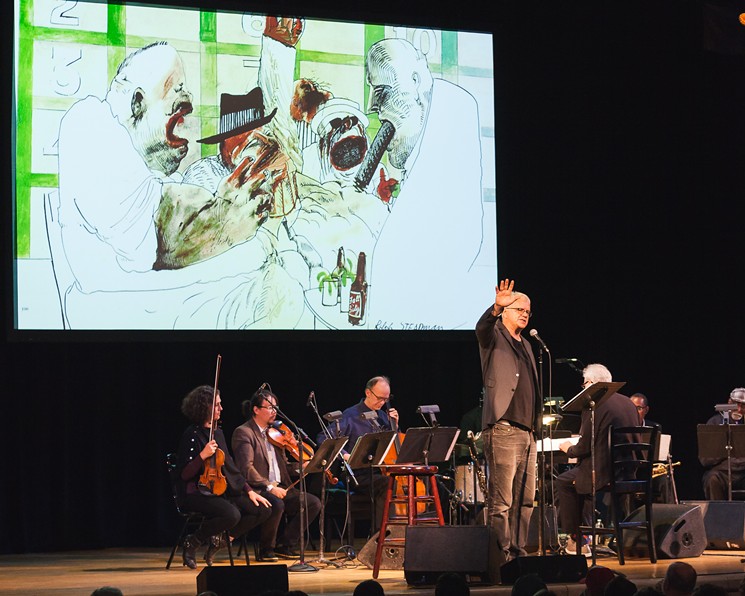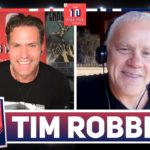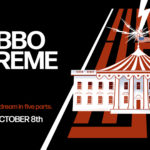Well, we were all fueled up. A pair of double mint juleps purchased at the theater bar cost $57, with tip. At least they let us take the souvenir cups to our seats. As the lights went down, my friend grumbled about the evening’s “cocktail rape” and leaned down between the seats. I heard him snort, twice. He sat up and stuffed a small plastic bag of white powder into his pocket, along with my house keys. (OK, not really, but…)
Whatever, the technical (or pharmaceutical) truth of Hunter S. Thompson’s “journalism” has never been the point – but what is it about the man’s writing that makes one want to live and mimic and go mad inside that voice of his? It’s a sort of siren song for a certain type of young man — and it’s almost always men — that senses in Thompson’s writing a way of life that will forever be just beyond his grasp. It’s a life of rebellion and drugs and pay-no-heed lunacy. It’s seductive, and when you’ve devoured enough of it, it tends to stay with you. Just ask Bill Murray and Johnny Depp. In 1980, Murray starred as Hunter alongside Peter Boyle in Where the Buffalo Roam, an incoherent film that nonetheless left a permanent imprint on Murray’s psyche. Forever quoting his deranged grounds keeper Carl Spackler in Caddyshack? That classic came out three months later; that’s Murray channeling pure Hunter. In 1998, Johnny Depp took his turn as Hunter in the Terry Gilliam–directed Fear and Loathing in Las Vegas. Five years later, Depp would drown in riches for his role as Captain Jack Sparrow in the first of the Pirates of the Caribbean franchise. Much was made of his Keith Richards impersonation, but Depp was really just playing Hunter in pirate’s drag.

Now maybe Tim Robbins will be the latest A-list actor permanently infected by Hunter’s voice. On Friday, May 5, at the Town Hall theater on West 43rd Street, Robbins embodied Thompson in The Kentucky Derby Is Decadent and Depraved. Directed by Chloe Webb (Sid & Nancy, Twins, Shameless), with music composed by Grammy-winner Bill Frisell, the show is based on the work that birthed the Gonzo style, back in 1970 when Thompson was dispatched to his boyhood home of Louisville, Kentucky, to cover the Derby for Scanlan’s Monthly. Meeting him there would be a confused Welshman named Ralph Steadman, an artist prone to grotesque illustrations that tended to capture the ugly realities in his midst. The pairing would prove to be a marriage of demented equals that would produce words and images now impossible to separate in the creative consciousness.
At that Derby 47 years ago, both writer and artist would go to pieces on a three-day bourbon bender as they sought to capture the “whiskey gentry” in all their loathsome old Kentucky home glory. It was a homecoming of sorts for Thompson. After a turbulent troublesome youth in Louisville, he’d achieved a degree of literary prominence with the publication in 1966 of Hell’s Angels: A Strange and Terrible Saga. At the dawn of the Seventies, he was on the cusp of legend — and caricature. Fear and Loathing in Las Vegas would come soon after, along with scores of Rolling Stone stories that would cement his character — cigarette holder, aviators, loud shirts, cargo shorts, and copious amounts of drugs in every pocket — one that would soon outstrip his prose. But on Derby Day 1970, Thompson and Steadman were just another pair of staggering bourbon-breathed beasts roaming Churchill Downs
The Town Hall show captured that spirit, in large part thanks to Tim Robbins’s uncanny embodiment of Hunter. The piece couldn’t be called a play or theater, per se. It was closer to performance art, with a world-class music ensemble assembled behind Robbins, performing Bill Frisell’s original score. Occasionally, Robbins was joined by a supporting cast of performers — including Brad Hall, who voiced the roles of Steadman and other assorted characters in Thompson’s story. There was also a confusingly long prologue of animation and newsreel of Derby days past that aired on a screen behind the band before the reading began. It was so long that my friend leaned over at one point and insisted: “The director must be fucking with us.”
Then there was the giant horse puppet that appeared first in the mezzanine and then roamed down the center aisle before finally staggering onstage alongside Robbins, with a Hunter-esque cigarette holder hanging from its snout. It was an amusing diversion, but less than necessary. The decorative bits of production were nice, but they were neither here nor there. This was all about the seduction of Hunter S. Thompson’s singular voice, and Robbins captured it.
At the end of the show, with Brewer & Shipley’s “One Toke Over the Line” playing, per Hunter’s approval in the sky, my friend leaned over and sniffed and said: “That’s the voice I wish I always had in my head.”



